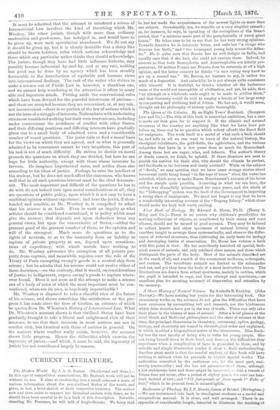CURRENT LITERATURE.
• The Modern World. By J. A. G. Barton. (Blackwood and Sons.)— In this age of competitive examinations, Mr. Barton's work will not be without its use. It aims at condensing into a small compass a mass of various information about the non-civilised States of the world, and gives, in fact, a brief sketch of their respective histories. The author now and then omits to connect his historical periods with dates, as he should hare been careful to do in a book of this description. Notwith- standing Mr. Freeman, he will talk of Anglo-Saxons. We fancy that I he has not made the acquaintance of the newest lights on more than one subject. Occasionally, too, we stumble on a very singular remark; as, for instance, he says, in speaking of the corruptions of the Stuart period, that " a mistress made part of the paraphernalia of every great house." He takes care to let us see that he has very strong opinions. Towards America he is intensely bitter, and calls her "a virago who disowns her birth," and "the termagant young lady across the Atlan- tic." Ho is quite sure that Russia has no evil designs on India, and equally sure that if she had, she could not execute them. Indeed, he assures us that both Russophobia and Americophobia are utterly pre- posterous. Of neither France nor Prussia does he entertain at all a high opinion, and the latter country he thinks "is now trying very hard to get up a second war." Mr. Barton, we venture to say, is rather too much of a dogmatist. And unluckily, he is not always quite consistent with himself. It is doubtful, he thinks, whether all the barbarous races of the world are susceptible of civilisation, and yet, he adds, that "an attempt on a wholesale scale ought to be made to civilise them," and that Germany,would do well to employ a fourth of her large army in conquering and civilising half of Africa. He has not, it would seem, thought out his philosophy of history quite thoroughly.


































 Previous page
Previous page